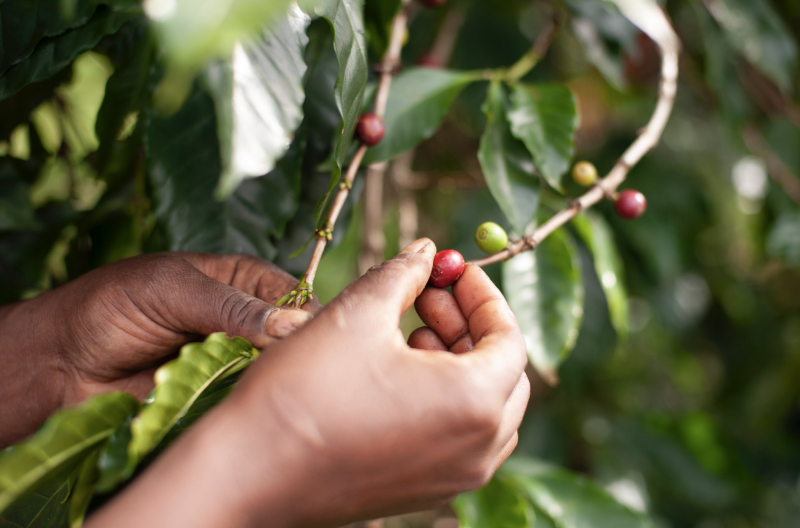Photographs by Bianca Thielke
Interview with Bente Luther-Medoch
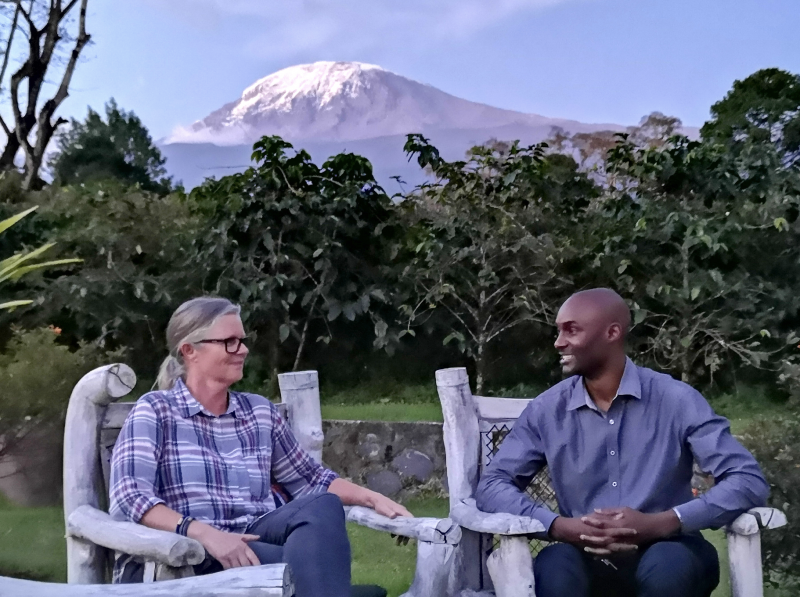
While it may in some ways be seen as problematic or form part of a ‘white saviour’ mentality, we have over the years engaged with a number of expats who are bettering the profile of African coffees and successfully bettering the communities by living at origin, The Carlson family’s work with Long Miles Coffee Project in Burundi comes to mind as a great success story.
The challenge with all foreign investment, of which there is much in coffee in Africa, is to follow ethical business models that benefit the local communities rather than pillage the land for next to nothing. The specialty coffee community is at the forefront of that fight; to demand better prices for coffee and make sure that the knowledge of where and from whom your coffee comes is not just words on a label.
Bente Luther-Medoch is one such human who has for the last 20 years dedicated her life to the study of coffee and the of people who make it possible. The foothills of Kilimanjaro provide incredible soil for growing coffee, and as Bente soon discovered, tea. We had the opportunity to pick her brain about the struggles and triumphs of ethically farming coffee in Africa.
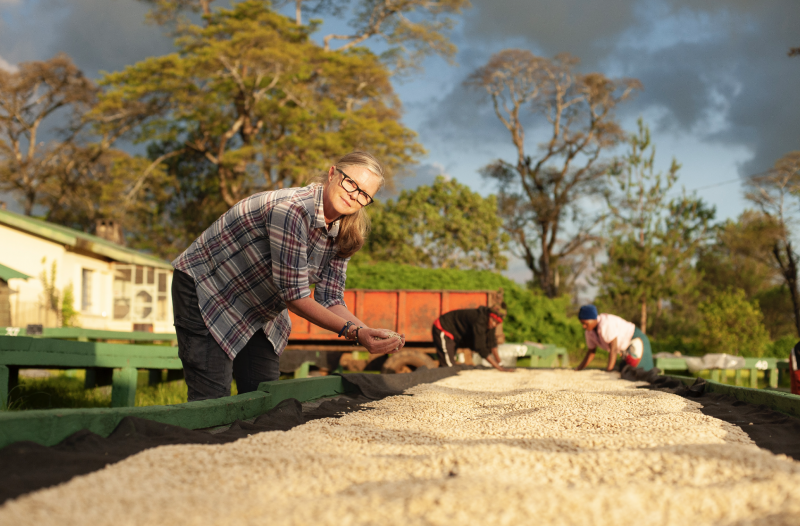
First of all, how did you find yourself on a coffee farm in Tanzania?
“I was originally a pre-school teacher, until I took the leap and opened my own dance and fitness studio in Germany when I was 25. During this time, I met my husband, Ralph. He has always been a coffee trader. As a buyer he had the opportunity to visit the origins and I was lucky enough to travel with him occasionally. What can I say, I got hooked on Africa. I arrived in Tanzania in 1992 and have been here ever since. In 1998 the farms in Kilimanjaro were released by the government for investors. The Machare Coffee Farm is leased land owned by the Government of Tanzania. The annual lease rent is paid directly into the account of the Coop society of the neighbouring villages. I became in charge in 2001. I learnt everything from scratch from a very good friend, a Kenyan, Peter Gethi. After three years we were the first farm UTZ certified in Tanzania and four years later we became the first farm to be Rainforest Alliance certified in 2007 in Africa. Team years later we began to focus on becoming Organic and we are now fully certified. My original job was to check on the accounts, but along the way I became a farmer. You can’t look after the money if you don’t understand what it’s all about. I am the self-training type. I read and can try, then continue to learn by experimenting until I get it right. And we implement that in how the team works, we try until we get it right.”
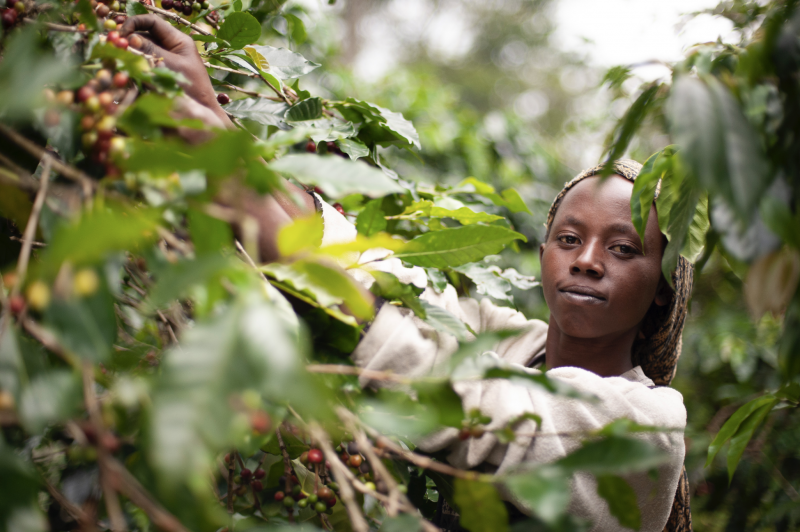
What does sustainability and organic farming actually mean?
“We have been focused on sustainability since 2004 when we made the change to become organic. We were the first certified farm in Tanzania. We live on the farm, most of the expats who own or lease farms don’t live on the farms and we saw first hand what impact pesticides and chemicals hand on the land and more importantly, the people. It’s poison! In the beginning it was an extremely difficult process to get everything in place to become certified, now the steps and hard work we put in at the start mean being sustainably organic is a natural part of our days here. We have reduced water usage by over 90%, we use biofuel for machinery, preserve the habitat through shade-grown coffee, minimises the use of chemicals and have created a tree project to maintain eco-balance on the famous mountain.”
Community engagement and involvement has to be at the top of the agenda, how do you engage with and invest in the Kilimanjaro community?
“I took three years when I first arrived here just to listen and to learn about what was actually needed. Not do what I thought was best as a foreigner and that would be seen as a short term fix. What I learned was that we could help with infrastructure for basics. We have worked on water projects to ensure the communities have access to clean water from a tap. We focused on steps to help halt deforestation through a firewood project. Fire is necessary to cook so we planted stalks for this purpose. We are also in the process of converting to bio-gas units, where the dung of one cow is enough to fuel a households needs.
Everybody around us are also small-holder farmers, they have the knowledge and they are really excellent farmers, but they didn’t have access to the market, so we helped them to just get access to suitable buyers so that they form direct trade relationships with roasters from around the world. The farm employs many of the cooperative members throughout the year, and many, many more during the harvest.”
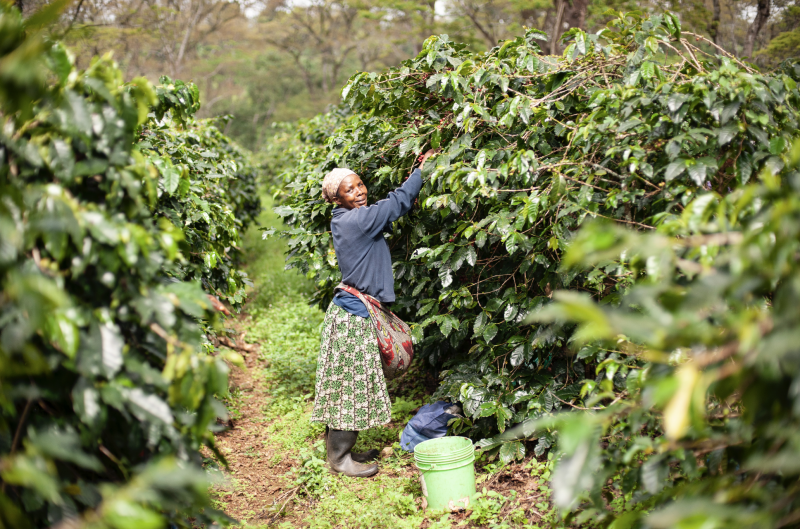
How has international perception of African coffees changed over the last 10 years?
“I believe African coffees have benefited from the trend to move away from blends to the search for unique single origin coffees. The soil and natural resources here mean that we are able to produce some truly unique coffees and they are allowed to shine in this new market that appreciates quality over quantity.”
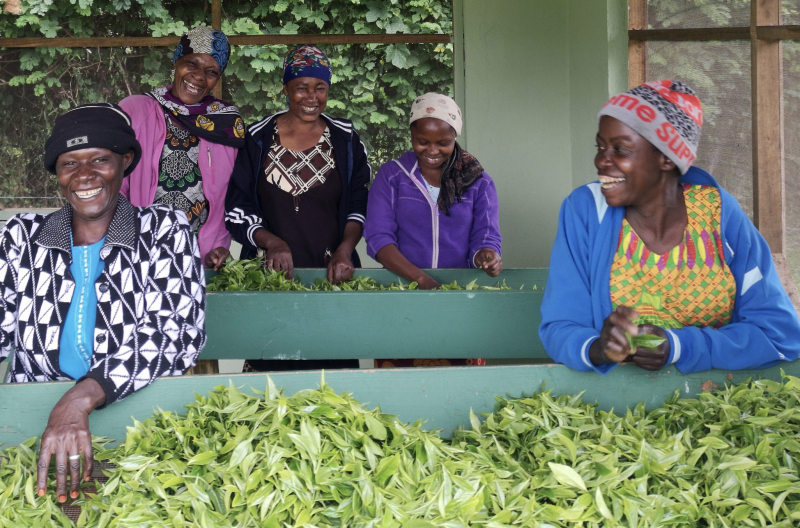
You have recently diversified into tea farming and production, tell us about that journey?
“The tea business is very dear to me and this is how it started. I always wondered why there was no tea grown on Kilimanjaro when it is widely grown all over Tanzania. I was told it does not grow, but I could not accept that and planted a small trial field having no clue how to process tea, which is the most integral part of tea production. Three years later the first leaf was ready to be plucked in 2015. This encouraged me to start studying more on tea processing on the internet. I continued to do trials in my kitchen. My goal was to make real handmade tea that is traditionally processed but leaving the leaf whole, a speciality tea. After three months a friend took samples to Germany. I had made Green tea, Oolong tea, Black tea and Silver Needles and the feedback was very positive which encouraged me to continue. After another year there was more demand and as I was not able to expand my Tea garden on Kilimanjaro quick enough, I began buying leaf from Smallholder Farmers in Usambara Mountain region of Tanzania. Today I have been encouraged to plant more tea on Kilimanjaro by the Regional Commissioner of Kilimanjaro which became a significant milestone. I always feel the need to innovate in new ways, so I am now also making tea from the leaf of coffee trees and from the coffee Flower, as well as from the coffee cherry, which is known as cascara. Tea is interesting to me because we are creating a complete product, unlike coffee where we deliver a raw product to roasters, with tea you need to decide as you are picking which kind of tea you will be making and once processing is complete it is ready to be drunk! Black Tea, Green Tea, Oolong Tea and Silver Needles, all come from the same Bush. It just depends on the processing what the final product will be. Green tea is steamed as it is still very crisp and thereafter immediately rolled and dried, so it does not change its colour. We want it to be still green, when hot water is poured onto it. All other teas will first thing after plucking be allowed to wither (dried out) for 24 hours approx. Thereafter it is being rolled and then fermented. It now depends on the fermentation time what kind of tea you want. Black must be fully fermented until its red like rust (it is also called oxidization). Only the Silver Needles will not be rolled at all. They are the finest tea. The buds are by hand removed from the leaves and after withering it will be immediately dried. Of course, there are many variations of this.
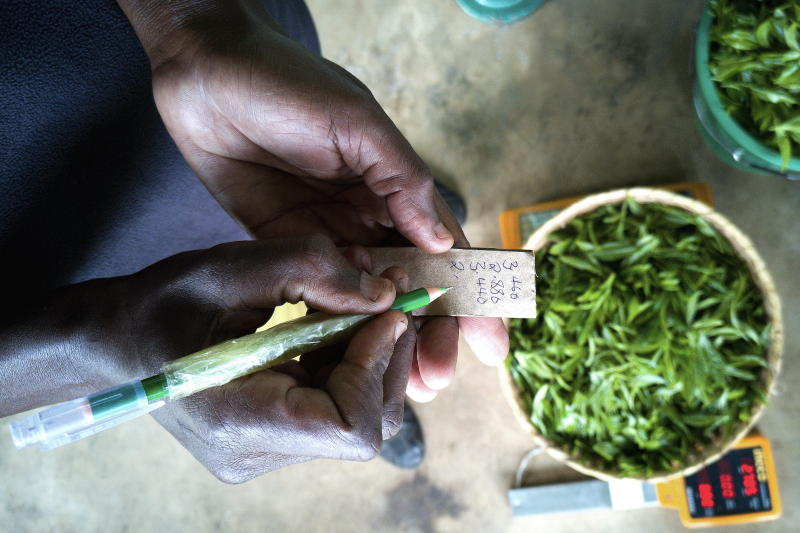
A note from the Photographer, Bianca Thielke
“I was running a Thai Restaurant in Moshi town and this white couple visited the restaurant regularly in the evening. It was an open restaurant with a Makuti roof, when one night we had a lot of wind and guests were rather running away, but they both seemed so undisturbed that I was curious to find out where they were from. Funnily enough, it was the same region I was from, in northern Germany, Schleswig Holstein, where wind and storm is not rare. I found out, Bente was a coffee and tea farmer, and her husband, Ralph was buying coffee for a big German coffee trader/company. They had been in East Africa over 20 years but had just been quietly farming and off the radar for all the other expats around in Moshi, it seemed. Since then we became very good friends. It my privilege to be able to share their story.”
